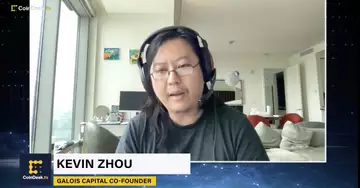For months, Kevin Zhou, co-founder of hedge fund Galois Capital and former head of trading at digital asset exchange Kraken, has been sounding the alarm about LUNA and UST issuers Terraform Labs.
Just today, Terra briefly halted its blockchain, citing inflation for LUNA and the potential for government attacks after the token's price fell to less than 2 cents.
And within 72 hours, the Terra ecosystem, which includes the LUNA token and TerraUSD (UST) among other algorithmic stablecoins, was in freefall. The price of LUNA has fallen by more than $80, while UST, the stablecoin pegged to the U.S. dollar, dropped to 37 cents earlier today.
Despite his concerns, Zhou is amazed at how quickly things have turned for the worse for the Terra ecosystem. "Even if it happened in slow motion, even if it was something like a bank walk, it was more about this thing not being solvent," Zhou said on CoinDesk TV's First Mover.
But in the end, it was inevitable, Zhou said, adding that "the mechanism was flawed and didn't develop as expected."
As a result, Terra made a proposal to its users to burn 1 billion UST (more than $690 million) to save the stablecoin using the community's UST. It said it would also increase the circulation of LUNA, which supports UST, to 100 million tokens to push UST back to $1.
Financial firms such as BlackRock and Gemini dismiss conspiracy theories that the companies were involved in UST's collapse. On social media, hedge funds said they do not trade UST.
Zhou underscores the sentiment, citing regulatory compliance issues, which is why financial firms could not touch these types of assets.
While markets have been rattled by the UST collapse, millions of people have been affected. "Many people have lost their homes, a lot of money and maybe even their entire savings," Zhou said.
The mood around the Terra ecosystem will continue to deteriorate, Zhou adds, in part because "it's not just a mechanical death spiral, but also a psychological one," he says.
In hindsight, the warning signs were there when founder Do Kwon bought large amounts of Bitcoin and began collecting millions of dollars from investors. While that wasn't necessarily a bad move, it highlighted a more important point. "It signaled to the market that they no longer believed in their own story," Zhou said.
Now that Terra is trying to restore the UST's $1 peg, Zhou thinks it's possible that it will succeed, but not guaranteed. He notes that Terra should have revalued its currency earlier and allowed users to take a massive discount, which might have eased some of the selling pressure on LUNA.
But at this point, "we're just experiencing hyperinflation of LUNA to support UST's exit, and now we just have to make it happen."
Terra's proposal is good, but not good enough, Zhou said. "At the end of the day, all this bad debt has to be eliminated, and we're still at the very beginning of that," Zhou said.

